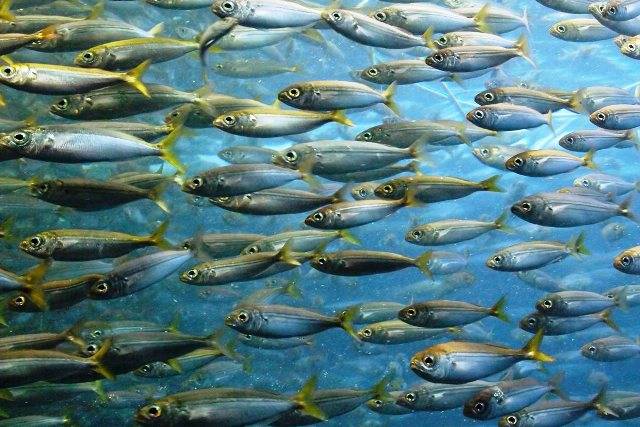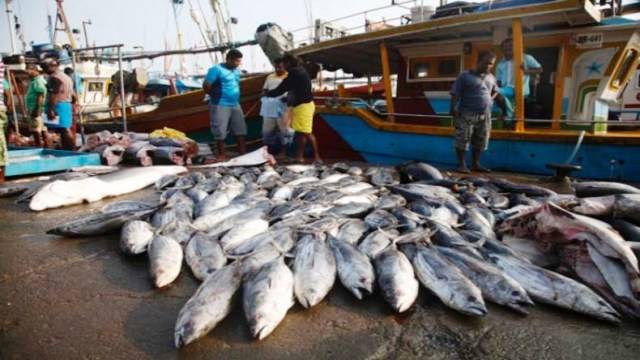
Fisheries Day
Apart from contributing to the Food Security of the country, Fisheries is an important sector in India that provides employment to millions of people. India has over 8,000 km of coastline, and an Exclusive Economic Zone (EEZ) of over 2 million sq km and extensive freshwater resources. Thus, fisheries play a vital role in the economy of the country with the practice contributing about 1.07 per cent to the GDP (Gross Domestic Product).
Fisheries in India make up to 5.3 percent to agriculture and allied activities. India's freshwater resources consist of:
-
Rivers and canals (197,024 km)
-
Reservoirs (3.15 million hectares)
-
Ponds and tanks (235 million hectares)
-
Oxbow lakes and derelict waters (1.3 million hectares)
Brackishwaters (1.24 million hectares) and estuaries (0.29 million hectares)

According to the CMFRI Census 2010:
-
There are 3,288 marine fishing villages and 1,511 marine fish landing centresin 9 maritime states and 2 union territories
-
The total marine fisher-folk population was about 4 million comprising in 864,550 families
-
Nearly 61 percent of the fishermen families were under the BPL category
-
The average family size was 4.63 and the overall sex ratio was 928 females per 1000 males
-
Almost 58 percent of the fisher-folk were educated with different levels of education
-
About 38 per cent marine fisher-folk were engaged in active fishing with 85 per cent of them having full-time engagement
-
About 63.6 percent of the fisher-folk were engaged in fishing and allied activities
-
Nearly 57 percent of the fisher-folk engaged in fish seed collection were females and 43 percent were males
-
Among the marine fishermen households nearly 76 percent were Hindus, 15 percent were Christians and 9 percent were Muslims.
-
The overall percentage of SC/ST among the marine fishermen households was 17.

Importance of world fisheries day
The world fisheries day also explores moves towards finding solutions to the increasingly inter-connected problems that world is facing to follow the sustainable model. Despite the growth of aquaculture, small-scale capture fisheries will continue to supply most of the fish consumed in much of the developing world in the coming decades. The majority of these fisheries are small-scale, operating in rivers, lakes, wetlands, coral reefs and estuaries in coastal seas, and provide livelihoods for millions of people.
Yet small-scale fisheries are frequently overlooked in discussions around the sustainable and equitable use of oceans, seas and inland water bodies.
World Fisheries Day serves as an important reminder that we need to change the way we manage global fisheries in order to maintain stocks and healthy aquatic ecosystems.
One in ten people on the planet rely on fisheries and aquaculture to support their livelihoods. While the fisheries sector has made great strides in recent years in ensuring environmental sustainability of the fish that is caught, less attention has been focused on how to ensure the sector is socioeconomically sustainable – guaranteeing that all workers along fisheries’ long and complex value chain have access to decent employment.
The 33rd session of the FAO Committee on Fisheries, held last July in Rome, provided FAO with the mandate to draft these guidelines, which will be discussed in the FAO Sub-committee on Fish Trade, to be held in Norway in 2019.
Fishing communities worldwide celebrate the day through rallies, workshops, cultural programmes and exhibitions highlighting the importance of human lives, of water and the lives it sustains.
21 November is celebrated as World Fisheries Day across the world. Apart from crucial source of food and livelihood to lacs of fisherfolks in India, fish diversity determines the health of the water body including lakes, ponds and rivers. However with growing threats and pollution mass fish mortality has been taking place in various rivers and lakes in the country every year. On World Fisheries Day 2018 SANDRP has put together known mass fish kill incidents that took place this past year to highlight the gravity of threat so that corrective measures can be taken by respective Governments and others concerned.
Due to close proximity of living habitats across water bodies, it has led to severe ocean and coastal pollution from run-off and from domestic and industrial activities carried out near-by. It has led to depletion of fish stocks in immediate vicinity, requiring fishermen to fish farther and requiring fishermen to fish farther and farther away from their traditional grounds.
It has also led to depletion of fish stocks in immediate vicinity, requiring fishermen to fish farther and farther away from their traditional grounds. Besides, overfishing and mechanization has also resulted in a crisis. Fish sticks have depleted through ‘factory’ vessels, bottom trawling, and other means of unsustainable fishing methods....
Recently, United Nations study had reported that more than two-thirds of world’s fisheries have been overfished or are fully harvested. It also reported that more than one third fisheries are in state of decline because of factors such as the loss of essential fish habitats, pollution, and global warming. The World Fisheries Day helps to highlight these problems and moves towards finding solutions to increasingly inter-connected problems and in longer term, to sustainable means of maintaining fish stocks.









